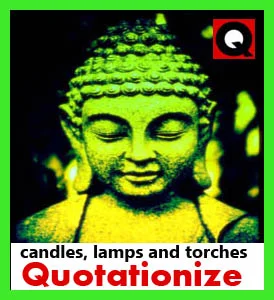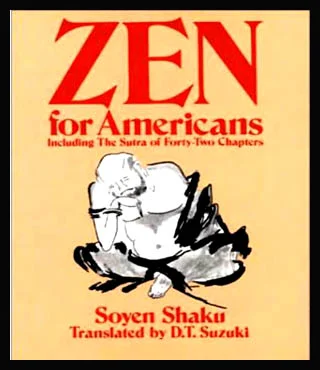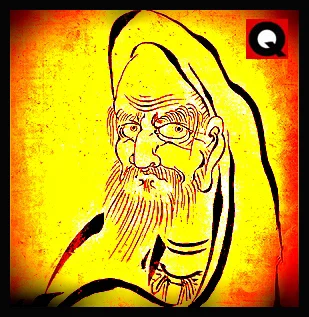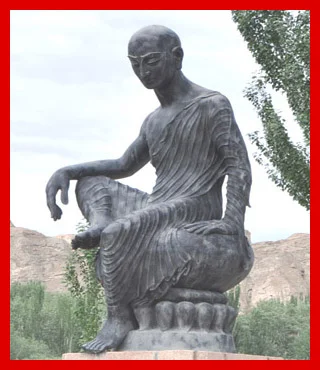“Thousands of candles can be lighted from a single candle, and the life of the candle will not be shortened. Happiness never decreases by being shared.”
Now if you ask Google, “Who said thousands of candles can be lit from a single candle?“.
Without a flicker of doubt, Google says it is Buddha in bold.
So is, if you ask Google “Who said happiness never decreases by being shared?“.
Happily Google will say it is “Buddha” again.
So, is this oft-quoted line actually by Gautama Buddha?
Of all the Buddhist texts, this quote is found only in the book called “The Teachings of Buddha” published by Bukkyo Dendo Kyokai.
You can find this book in various languages over here.
(The Teaching of Buddha: Wheel Of Dharma By Bukkyo Dendo Kyokai, Bukkyo Dendo Kyokaim, 1966, The Way Of Practice, Ch. One The Way Of Purification, II The Good Way Of Behavior, 9, P. 127) source
(The quote is also found in: The Teaching Of Buddha By Bukkyo Dendo Kyokai, A New Delhi:Sterling Paperbacks, Part III: The Way Of Practice, The Way Of Purification, II: The Good Way Of Behavior, 9, P. 87) source
Bukkyo Dendo Kyokai (BDK) is a Society for the promotion of Buddhism established by the late Rev. Dr. Yehan Numata in Japan in 1965.
Its aim is to translate the Chinese and Japanese Buddhist texts from the Taishō Shinshū Daizōkyō into English.
According to BDK, the book “The Teaching of Buddha” is a collection of Shakyamuni Buddha’s teachings.
Shakyamuni Buddha is a name given to Siddhārtha Gautama, the Indian prince.
In other words, all the content is this book is the sacred texts of Gautama Buddha.
Buddha True teachings
Before we can argue whether this quote is actually from Gautama Buddha, or another misquote, we must define what are considered as the true words of Buddha.
When you read about Buddhism, you would come across these varied terms widely used:
Buddha teachings, Buddha sayings, the words of the Buddha, in Buddha own words, spoken by the Buddha or the preaching of the Buddha.
From what I have gathered, the Buddhist canon is vast, complex and difficult to define.
Basically it is because given the long time span and vast geographical range of the Buddhist history.
That’s why when you explore Buddha and Buddhism, you would encounter terms like: ‘it is said’, ‘the claim’, ‘absence of evidence’, ‘remains disputed’ and ‘not clear’.
It is because the Buddha teachings are NOT written down by Siddhārtha Gautama himself.
From what I have read, these teachings or the sermons of Buddha were preserved orally by the Sangha (Buddhist community).
It was about 454 years after the death of Gautama, then only they wrote down his sacred words in various Indo-Aryan languages.
Collectively, these Buddhist texts are called Suttas (Pali) or Sutras (Sanskrit).
The claim that these Buddhist texts were “spoken by the Buddha”.
Then they were translated into Chinese and Classical Tibetan.
These collections, plus the Vinaya Pitaka (monastic rules) and Abidhamma/Aabidharma (philosophical texts) compose the Buddhist Canon.
To complicate the matter, the Buddhist schools of thought is divided into into three sects with different doctrines.
They are Theravada, Mahayana and Vajrayana.
Each of the schools claimed to represent Buddha’s original vision and teachings.
One claims Gautama was a God and savior, while the other says he was just a man, not a God. He was a teacher, not a savior.
Theravada Buddhism claims itself to be the oldest school, and it sticks to the Buddha’s original teachings.
But the modern scholars do not agree to that.
There are so many aspects of Buddhism considered to be uncertain or dubious.
After all, when we talk about Buddha and Buddhism, we are talking about legend, myth and belief.
According to Jana Igunma, the curator of Buddhism at the British Library (2020), there is no consensus whether Buddhism is a religion or not.
Buddhism has no “supreme divine being or creator god”; the Buddha is more like a teacher, a guide, and one studies his philosophy and his life by way of texts and illustrations.
Igunma adds, “Buddhism isn’t exclusive: you can practise it, or adopt elements of it, any way you want. Nobody is going to tell you you’re doing it wrong. Also, Buddhism isn’t evangelical: whether or not you choose to listen to the Buddha’s teachings is on you.”
So, the big question is which is the so-called the true teachings of Buddha?
It is not easy to verify the authenticity of Buddha’s words.
Furthermore, there is the lost in translation problem.
Candles, torches & lamps
Probably that is why we have candles, torches and lamps, as you would find out later in the post.
Thousands of candles Buddha quote
Now, let’s get back to the quote: “Thousands of candles can be lighted from a single candle, and the life of the candle will not be shortened. Happiness never decreases by being shared.”
Is it really one of Gautama Buddha’s own words?
I am not certain, as this quote is found only in books published by Bukkyo Dendo Kyokai of Japan.
The Sutra Of Forty-Two Chapters/Sections
While I was searching for thousands of candles quote, I saw the light, so to speak.
They are not lighted candles, but flaming torches.
Probably the quote is paraphrased and summarized from the text from Chapter/Section 10 of “The Sutra Of Forty-Two Chapters” aka “The Sutra Of Forty-Two Sections”:
“The Buddha said, “It is like a lighted torch whose flame can be distributed to ever so many other torches which people may bring along; and therewith they will cook food and dispel darkness, while the original torch itself remains burning ever the same. It is even so with the bliss of the Way“
(Sermons of a Buddhist Abbot [Zen For Americans] Addresses On Religious Subject By The RT. Rev. Soyen Shaku, Including The Sutra Of Forty-Two Chapters; Translated from The Japanese By Daisetz Teitaro Suzuki, Chicago: The Open Court Publishing Company, 1906, The Sutra Of Forty-Two Chapters, 10, P. 6) source
The quote is also found here and here.
This is another translation of this line:
“The Buddha said, “Consider the flame of a single torch. Though hundreds and thousands of people come to light their own torches from it so that they can cook their food and ward off darkness, the first torch remains the same. Blessings, too, are like this.”
(Sutra in Forty-Two Sections, Translated By The Buddhist Text Translation Society, Section 10, Joyful Charity Brings Blessings) source
NOTE: Strangely, this line is found in Section 8 in Bukkyo Dendo Kyoka’s “The Sutra Of Forty-Two Sections”.
The Sutra Of Forty-Two Chapters is said to be the first Indian Buddhist sutra translated into Chinese (四十二章經) by two Indian missionaries, Kasyapa Matanga and Gobharana.
These two translators extracted the passages from different Buddhist Canonical books.
The Chinese version of this sutra is:
“佛言。譬如一炬之火。數千百人。各以炬來分取。熟食除冥。此炬如故。福亦如之。”
(佛說四十二章經, 第十章‧喜施獲福) source
This is another source of the Chinese version.
One lamp lighting a hundred thousand lamps
My next bright discovery is not just thousands of candles, but a hundred thousands of candles or so.
This is another similar quote taken from the Mahāyāna sutras, “The Avataṃsaka Sūtra”.
There are three different titles in English: “Flower Garland Sutra”, “Flower Adornment Sutra”, or “Flower Ornament Scripture”.
The text reads:
“…like one lamp lighting a hundred thousand lamps so that all darkness is illumined and the light never ends”
(The Flower Ornament Scripture, A Translation Of The Avatamsaka Sutra By Thomas Cleary, Boston & London: Shambhala Publications, Inc, 1993, Ch. 39, Entry Into The Realm Of Reality, 11. Sudarshana, P. 1583) source
(Another source of this book is found here.)
(The quote is also found in: Entry Into The Realm Of Reality: The Guide, A Commentary On The Gandavyuha, The Final Book Of The Avatamsaka Sutra By Li Tong Xuan, Translated By Thomas Cleary, Boston, Massachusetts: Shambhala Publications, Inc, 1989, The Fifty-Three Teachers, 11. Sudarshana, P. 39) source
The inexhaustible lamp
Finally, I came across this line from “The Vimalakīrti Nirdeśa” (aka The Vimalakīrti Sūtra or Vimalakīrti Nirdeśa Sūtra).
“… a single lamp may light hundreds of thousands of lamps without itself being diminished.”
This is NOT by Gautama Buddha.
This thousands of lamps quote is by Vimalakīrti.
He was a figure of the Mahayana literature.
Vimalakirti was a wealthy and very wise lay practitioner of Buddhism in India.
“… a single lamp may light hundreds of thousands of lamps without itself being diminished.” – Vimalakirti
(Vimalakirti Nirdesa Sutra, Translated By Robert A. F. Thurman, Pennsylvania: The Pennsylvania State University, 1976) source
(The quote is also found here, here and here.)
This is another English translation translated by Burton Watson from the Chinese version by Kumarajiva (鸠摩罗什), a well-known Buddhist monk, scholar, missionary and translator.
“This Inexhaustible Lamp is like a single lamp that lights a hundred or a thousand other lamps, till the darkness is all made bright with a brightness that never ends.”
(The Vimalakīrti Sūtra By Kumārajīva, Translated By Burton Watson, Delhi: Motilal Banarsidass, 1999, Ch.4, The Bodhisattva) source
(The quote of this book is also found here.)
The other English translations are:
“The inexhaustible lamp is like a lamp that ignites a hundred thousand lamps, illuminating all darkness with an illumination that is never exhausted. “
(The Vimalakirti Sutra Translated From The Chinese (Taisho Volume 14, Number 475) By John R. McRae, Calif: Numata Center for Buddhist Translation and Research, 2004, The Sutra Preached By Vimalakirti Also called “The Inconceivable Emancipation” Translated By Tripitaka Master Kumarajiva Of The Yao Qin [Dynasty], Fascicle One, Ch. IV Bodhisattvas, P. 103) source
The Chinese version of this quote:
“無盡燈者,譬如一燈,燃百千燈,冥者皆明,明終不盡”
(維摩詰所說經(一名不可思議解脫上卷), 姚秦三藏鳩摩羅什譯, 佛國品第一, [0543b12] ) source
(The Chinese translation is also found here.)
It is enlightening to know there are thousands of candles, lighted torches and a hundred thousand lamps that glow in the world of Buddhism.
I hope you are enlightened now, and take the lighted path out of the muddled world of misquotes.







